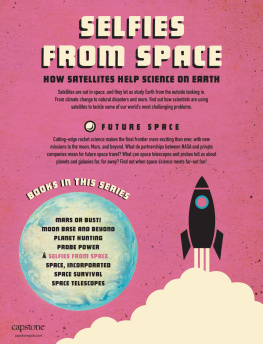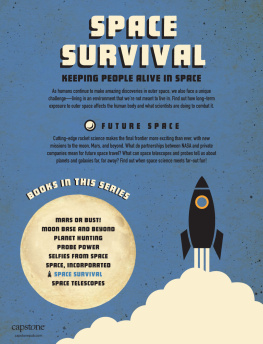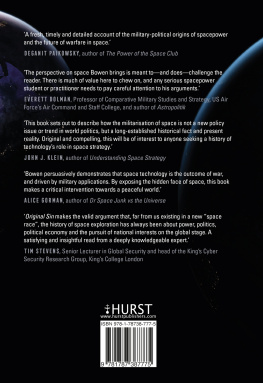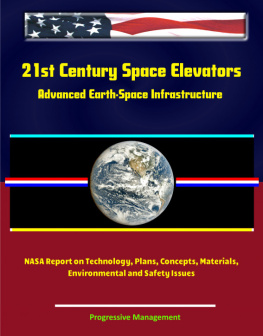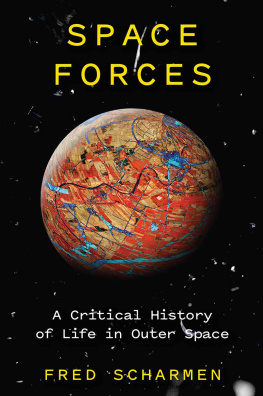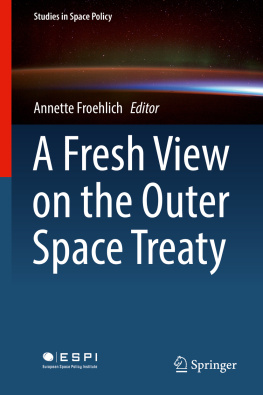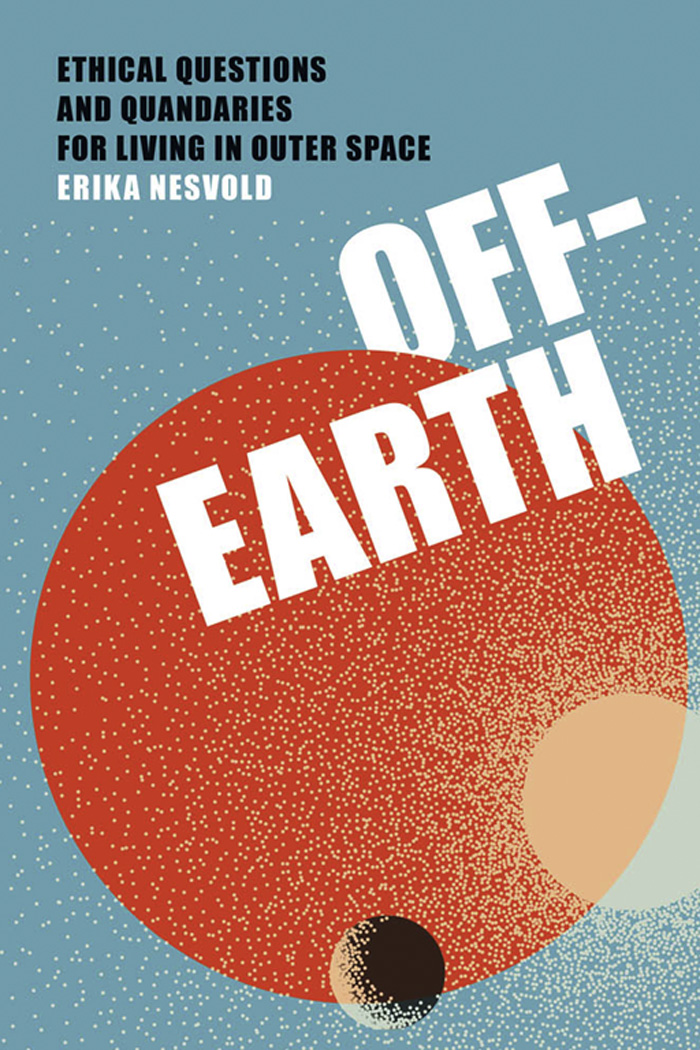
Off-Earth
Off-Earth
Ethical Questions and Quandaries for Living in Outer Space
Erika Nesvold
The MIT Press
Cambridge, Massachusetts
London, England
2023 Massachusetts Institute of Technology
All rights reserved. No part of this book may be reproduced in any form by any electronic or mechanical means (including photocopying, recording, or information storage and retrieval) without permission in writing from the publisher.
The MIT Press would like to thank the anonymous peer reviewers who provided comments on drafts of this book. The generous work of academic experts is essential for establishing the authority and quality of our publications. We acknowledge with gratitude the contributions of these otherwise uncredited readers.
This book was set in Arnhem Pro and Frank New by New Best-set Typesetters Ltd. Printed and bound in the United States of America.
Library of Congress Cataloging-in-Publication Data
Names: Nesvold, Erika, author.
Title: Off-Earth : ethical questions and quandaries for living in outer space / Erika Nesvold.
Description: Cambridge, Massachusetts : The MIT Press, [2023] | Includes bibliographical references and index.
Identifiers: LCCN 2022006370 (print) | LCCN 2022006371 (ebook) | ISBN 9780262047548 (hardcover) | ISBN 9780262372527 (epub) | ISBN 9780262372534 (pdf)
Subjects: LCSH: Space coloniesMoral and ethical aspects. | Space coloniesSocial aspects.
Classification: LCC TL795.7 .N47 2023 (print) | LCC TL795.7 (ebook) | DDC 629.44/2dc23/eng/20221003
LC record available at https://lccn.loc.gov/2022006370
LC ebook record available at https://lccn.loc.gov/2022006371
10987654321
d_r0
Contents
Preface
Well worry about that later is not something I ever expected to hear from a leader in the space industry. And yet, sitting in a conference room in Mountain View, California, in 2016, thats exactly the response I received from the CEO of a (now-defunct) space mining company when I asked him how he planned to address the planetary protection risks of his lunar mining equipment. I was spending the summer in Silicon Valley as part of a NASA (National Aeronautics and Space Administration) research program that brought together astrophysicists, like myself, and machine learning experts to tackle big data problems in planetary defense. The program directors had lined up a number of visits with people working in the NewSpace industry: entrepreneurs and engineers who hoped to make space travel cheaper and easier while building a new and highly profitable economy in space. Ive always been a proponent of not only space science and human space exploration but also the longer-term goal of permanent human settlement in space. At the time, I was also considering a career shift from research science to industry, so I was excited to talk to these industry experts to get a sense of what open questions in the field remained to be addressed.
To my dismay, I quickly discovered that the private space industry professionals I talked to that summer, even the ones who shared my dream of building communities in space, had little interest in questions that seemed crucial to me: How will we protect the space environment from our own activities? How will workers in space be shielded from exploitation? Who will be responsible for settling conflicts between individuals living in space? Well worry about that later was the consistent response from the space industry representatives I encountered. Instead, they seemed to be focused exclusively on technical challenges like reusable rocket designs, economic strategies for making space activities financially feasible, and legal structures that would invigorate rather than inhibit their industry. This tunnel vision baffled me. Space settlement advocates often advertise space as a blank slate where we can build utopian societies free from the crowded territory and bloodied history of our terrestrial home. But adopting a worry about it later attitude toward human rights and ethics strikes me as a path to repeating the tragedies of that history through ignorance.
When I returned home to the East Coast from California and began researching some of these issues, I was relieved to discover that there are plenty of space ethicists and other scholars who are already considering how we can live justly and ethically in space. There also are countless researchers studying human society on Earth who have never considered their work in the context of space but have much to offer in the way of cautionary tales from our past and analyses of the origins of injustice and exploitation today. But there remains a disconnect between this wealth of knowledge and advice and the people who are actually working in the space industry.
During my research, I quickly identified one possible cause of this disconnect. As I read, I became uncomfortably aware of my own lack of education in history, sociology, anthropology, ethics, and the other humanities fields that were missing from my STEM (science, technology, engineering, and math) education. Given that most of the workers in the space industry, both public and private, are trained in technology, engineering, and physics rather than the humanities, perhaps it simply doesnt occur to them that the humanities can help us build better space communities. So, I reached out to experts in those fields and interviewed them about their research with an eye toward the implications for our future life in space. The result was a thirteen-episode podcast called Making New Worlds. My goal for the podcast was never to determine or dictate exactly which choices we should be making to ensure the best possible lives for future generations living in space. Instead, I hoped to prompt space settlement enthusiasts to join me in my search for the most important questions we should be asking in these early days of humanitys presence in space, and to recognize the abundance of accumulated knowledge that is already available to us, if we can manage to look beyond our technical training and default worldview.
This book is an expansion of the podcast, featuring additional interviews with relevant experts, further examples of historical case studies that can guide our future community-building, and updates on the progress of the private space industry, which has been busy in the years since I created Making New Worlds.
Its unlikely that Ill ever get to set foot on a space settlement, but all of us, even the majority who are destined to never leave our home planet, can work together to build a better future for our spaceborn descendants who will spend their lives there. And the time to start that work is now.
Introduction
In 1869, Unitarian minister Edward Everett Hale published a novella describing a hollow artificial satellite, The Brick Moon, cheerfully populated by men, women, and children who thrived on its surface after they were accidentally launched into orbit. Hales story was one of the first known works of fiction to describe humans permanently (if unintentionally) living in space, published almost thirty-five years before humans even invented the airplane. The same year the Wright brothers made their first flight, physicist Konstantin Tsiolkovsky published an equation for calculating the amount of fuel needed for a given spacecraft launch or maneuver, which eventually become known as Tsiolkovskys rocket equation (although it was independently derived by mathematician William Moore nearly a century earlier). Tsiolkovsky didnt live to see the first rocket launched into space, but he theorized that humans would one day venture throughout the Milky Way galaxy.
Next page

